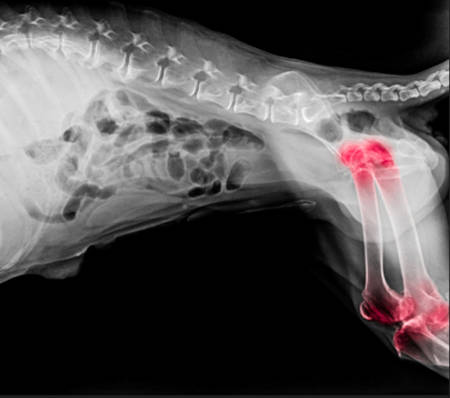
This article was updated on December 8th, 2023

Aging in dogs is often accompanied by behavioral changes that let you know when something is amiss. Older dogs suddenly barking for no reason is one frequent behavioral change and may hint at a deeper medical issue. Our veterinarians often meet dog owners concerned about their senior dog’s sudden unexplained barking. Rest assured, we can help. In this article, Dr. Woodnutt shares 5 tips to understand and help your dog.
Key highlights:
– A senior dog barking for no reason might indicate a number of age-related problems like vision or hearing loss, dementia, or pain
– Most barking-related problems can be managed with training, symptom management, and medication
– A dog barking for no reason may continue to bark unless you get to the bottom of the cause
– After ruling out medical concerns, you can try home remedies like ignoring your dog and teaching them other ways to communicate
5 things you should know about a senior dog barking for no apparent reason

1. Most causes involve dementia, hearing or vision loss, pain, or anxiety
Barking significantly increases in old age and is often a sign of an underlying problem. Our vets see senior dogs with a range of age-related problems causing ‘excessive’ barking, such as those below:
1. Dementia (Canine cognitive dysfunction – CCD)

Canine cognitive dysfunction is a disease similar to Alzheimer’s that causes a slow decline in cognitive ability, which can result in senior dogs barking for no apparent reason. About 14-35% of dogs over 8-years-old are impacted by CCD. This percentage increases significantly as dogs continue to age.
How to tell if your dog has CCD: If your senior dog constantly barks at nothing or a wall, then they could be suffering from CCD. Dogs with CCD will also often:
- be disoriented and walk aimlessly,
- be restless or irritable,
- become lethargic or slow to learn new tasks.
How to treat: The disease is progressive and has no cure. However, symptoms can be well managed, and many dogs will continue to have an excellent quality of life.
“There are a number of lifestyle changes, as well as pharmaceutical and nutritional interventions that may ease the signs of CCD.”
Learn more about CCD (Old Dog Syndrome).
2. Hearing or vision loss

As your dog gets older, their senses weaken. Most senior dogs have at least partial hearing and vision loss which can cause them to start barking more.
How to tell if your dog has hearing/vision loss: dogs experiencing sensory loss may:
- stumble,
- easily startle,
- stop responding to commands, and
- have changed interests in food.
How to treat: Partial sensory loss is normal in old dogs and nothing to worry about unless caused by a deeper medical issue. Identify what kind of sensory loss your dog is suffering from and adapt their environment accordingly. Read the tips provided by our veterinarians to Help a Dog Who is Suddenly Barking Because of Vision or Hearing Loss.
3. Pain

Your old dog may also be barking for a reason that is not visible to owners: they could be barking out of pain to signal distress and to get help.
“A senior dog’s body undergoes a fair degree of wear-and-tear over the years which can cause them pain and discomfort. For example, arthritis is estimated to impact as many as 80% of dogs over the age of 8.”
How to tell if your dog is barking because of pain: A dog in pain will not always show visible signs of pain, and it can be hard to decide if your dog is in pain or not. You might spot signs like:
- limping or a mild gait change,
- a reluctance to move or lethargy,
- depression, or even
- aggression and other behavioral changes.
How to treat: Pain should be diagnosed by a vet first and treated with prescription pain relief. In a senior dog, the risk of underlying issues is higher than in a younger pup. You should never give any Over-the-Counter human pain medications to a dog without your vet’s explicit instructions (many of these medications are toxic to dogs).
Learn more about Pain Relief for Older Dogs or read our article: Is My Dog in Pain?
4. Anxiety

Do you notice your old dog barking excessively when you leave the room or when they are left alone? If yes, your dog might be suffering from separation anxiety, which is a common condition in senior dogs.
“Separation anxiety can exacerbate in older dogs due to early doggy dementia or a decrease in senses. This condition can cause your furry friend a lot of distress, so it is important to find ways to deal with it.”
How to tell if your dog barks due to anxiety: An anxious dog will also often pant, pace, dig, shiver, destroy furniture, bark, or howl when the owner isn’t home or in the same room.
How to treat: Train your dog through out-of-sight stay exercises. Give them a kong stuffed with something tasty whenever you leave to associate your absence with something positive. Say goodbye several minutes before you leave, and don’t make a big deal about your departure, or your arrival back home. Another way to help your dog is to leave them with a recently worn shirt that smells like you. Learn more about Anxiety in Senior Dogs.
5. Frustration
If the barking happens during specific activities, then it could be due to frustration at not being able to complete certain tasks.
How to diagnose: Your dog barks in specific scenarios where he struggles with an activity. For example, if your dog barks at the foot of the stairs, they might be frustrated at not being able to climb them.
How to treat: Help your dog by making the activities he’s having trouble with easier for his aging body. If that’s not possible, you should distract them from the cause of frustration and redirect him to another activity. As long as the cause of the frustration is normal and age-related, there is nothing to worry about.
2. The type of barking can help identify the cause
We have just listed the common causes, but it can be tricky to decipher what is behind your dog’s excessive barking. It can be helpful to follow a step-by-step approach to help you figure it all out.
Owners can ask themselves the following questions to help identify the cause (with the help of your veterinarian):
1. What was your dog doing just before barking?
For example, if they were in front of the couch trying to jump up, it might be arthritis or pain that is holding them back and causing frustration. If your dog was just laying on their bed and staring at the wall, this could point more towards canine dementia or anxiety.
2. Where was your dog at the time?
For some, barking is linked to being in a certain location. A dog who only barks when outside may well be reacting to something in the environment, such as the lingering smell of the neighborhood fox or a nearby thunderstorm.
3. How long did they bark for?
Short bursts of barking are often a reaction to a certain stimulus, such as the dog who barks until their postman has left their drive. Continuous barking that doesn’t seem to have any particular trigger or end would more likely be caused by an underlying medical or behavioral disorder.
4. Have you noticed any other signs recently?
When there is a medical issue at play, barking will not be the only symptom. If a dog has canine dementia, as an example, we are likely to see additional signs such as staring into space or toileting indoors. Similarly, if your dog is in pain, you may find they are stiff when standing up or less eager on their walks.
3. Your vet will diagnose the issue with a physical exam & diagnostic tests
Your senior dog barking for no apparent reason might be the only thing you’ve noticed, but that doesn’t mean that’s the full picture. Owners will often be uncertain why their dog is barking as the answer is not always clear-cut.
Your vet will likely go through these steps to get to the bottom of things:
- History & symptoms: Your vet will take a full clinical history, focusing on the behavior around the barking and any other symptoms present.
- Physical exam: Your vet will check your dog from nose to tail and may also perform a neurological and orthopedic exam to identify physical issues such as pain or arthritis.
- Diagnostic tests: As underlying medical issues are commonly present, vets will also often run some basic tests, such as a blood test, urine test, and blood pressure check.
4. You can try these steps to help your dog at home
If you’ve ruled out the possibility of a deeper medical condition and are still wondering how to stop your old dog from barking for no visible reason, below are some tips to help.
1. Identify and address any medical issue
A lot of medical conditions could cause your dog’s behavior. This is why we recommend visiting your vet to identify or rule out any medical issues.
2. Stay calm & don’t raise your voice
Never yell or raise your voice. When your dog stops barking, even if it’s just to take a breath, reward them with a delicious treat. Repeat the process often, eventually adding the word ‘quiet’ as you reward them. Soon, the word ‘quiet’ will be associated with silence, and you’ll be able to use it to get your dog to stop barking.
3. Ignore your dog
If you’ve figured out that your dog is barking for attention, the only way to discourage this behavior is to ignore them. Attention-seeking dogs want attention regardless of whether it’s positive or negative and will continue to do it as long as you keep acknowledging it.
4. Teach your dog other ways to communicate
Dogs can’t communicate verbally and are limited to barking as their means of communication. You can discourage demand barking (barking to get something) by making your dog believe that their barking isn’t effective and teaching them other ways to communicate. For example, you can train your dog to ring a bell tied to the door when they want to go out and then reward the new behavior.
5. A trip to the vet should be the first task on your list
A visit to the vet can be the most important first step for being able to identify the cause of your senior dog barking for no apparent reason. Once you’ve figured out the reason, you can start training your dog to change their behavior.
“An important thing to remember here is that while all the techniques mentioned above can be successful, don’t expect them to work overnight. Be patient and allow your dog to take their time.”
Related Posts
 Old Dog Barking At Night: Top 6 Reasons & What to Do - Your old dog suddenly starts barking at night. You get up to investigate. You breathe a sigh of relief: there… [...]
Old Dog Barking At Night: Top 6 Reasons & What to Do - Your old dog suddenly starts barking at night. You get up to investigate. You breathe a sigh of relief: there… [...] Old Dog Barking A Lot? Our Dog Experts Share How to Help - Key Highlights: - Excess barking is common in senior dogs. - Possible causes include cognitive dysfunction, incontinence, pain, anxiety, frustration,… [...]
Old Dog Barking A Lot? Our Dog Experts Share How to Help - Key Highlights: - Excess barking is common in senior dogs. - Possible causes include cognitive dysfunction, incontinence, pain, anxiety, frustration,… [...]Disclaimer: This website's content is not a substitute for veterinary care. Always consult with your veterinarian for healthcare decisions. Read More.



Thank you for addressing this common concern! It’s so frustrating when our senior pups start barking unexpectedly. I appreciate the insights from the vet and will definitely try the tips shared to help my dog feel more comfortable. It’s comforting to know I’m not alone in this!
Thank you for this informative post! It’s such a relief to know that there may be underlying reasons for my senior dog’s barking. I’ll definitely be more observant of her behavior and consider a vet visit if needed. Your tips on how to manage the barking are really helpful!
Thank you for addressing this topic! My senior dog has started barking more frequently, and it’s been concerning. I appreciate the tips on potential causes and how to help her feel more comfortable. It’s reassuring to know we’re not alone in this!